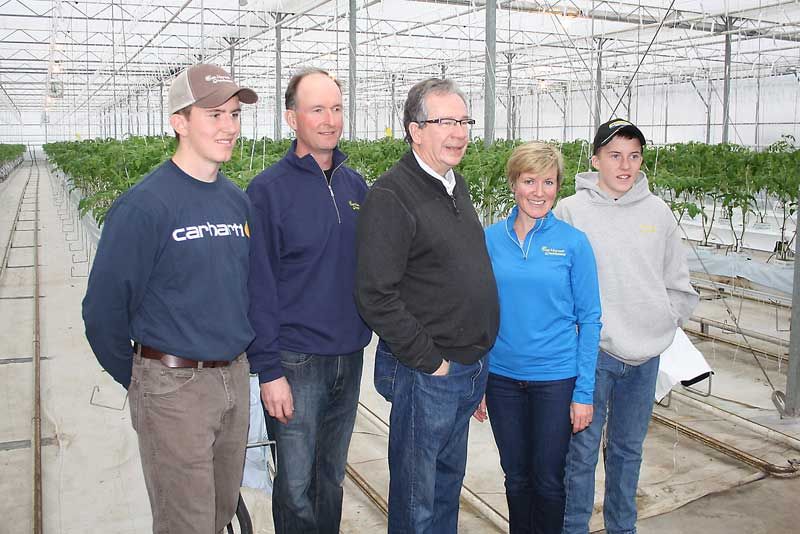Feb 04, 2015
by Jonathan Davies
The Minister of Agriculture, Jeff Leal, along with members of Frontenac and Kingston councils, took in presentations from a variety of agriculture ventures on a tour held January 29, which included Glenburnie's Sun Harvest Greenhouses and Inverary-area Bennacres sheep farm. Frontenac Federation of Agriculture members organized the visits. The minister's day concluded with a dinner hosted by the Frontenac Liberal Riding Association at the Lions' Hall in Verona.
The visit came on the heels of a January 28 announcement of several “food literacy goals” aimed at increasing consumers' awareness of local food. These goals are an extension of the Local Food Act, which came into effect in 2013 and focuses primarily on ensuring that public institutions source foods from within the province.
Not surprisingly, the minister was enthusiastic about the agriculture sector in Ontario.
"The future is going to be in agriculture in this province,” he said, adding that $34 billion in Gross Domestic Product comes from agriculture; 760,000 Ontarians are employed in the sector; and 23% of manufacturing is in agriculture.
He also said that consumers are choosing local food more and more.
“The consumers in Ontario are becoming more and more sophisticated in terms of the choices they're making. They're looking at where their produce is coming from,” said Leal in an interview from Sun Harvest.
The focus on local is welcome news for many farmers but questions remain about how the benefits of such policies will be enjoyed in our region. The Kingston area has itself seen an increase in interest in local food in recent years. Allison and Greg Shannon, owners of Sun Harvest, a greenhouse operation that has been running for 13 years, realized early on that their best route to success would be growing a high quality product and finding a niche selling directly from their location and through local independent shops. The Shannons have made a name for their brand of hydroponically-grown tomatoes, and have also branched out to include cucumbers, lettuce and asparagus in their vegetable roster, as well as offering seasonal craft-making courses. In an interview following the delegation's visit, Allison Shannon said, “The Local Food Act has great intent but doesn't have teeth. They are trying to enable and build a culture of people appreciating local food and entrepreneurs are already doing that.”
She noted that the term 'local' is a relative one and in the case of the Local Food Act, refers to all of Ontario.
“Consumers may not realize when they see local labels in a grocery store that it may not be from within the region at all,” she said.
While Sun Harvest is a large hydroponics grower by Frontenac standards, its one-third acre of greenhouse space devoted to tomatoes is dwarfed by similar operations in parts of south-western Ontario, where up to 100 acres may be developed. The relatively small scale of most agriculture operations in the Frontenac region means that institutions such as hospitals and universities, which are the focus of the Act, may source from elsewhere where supply is greater.
Part of the scale challenge lies in the nature of the land. The shallow soils that cover much of the county can be difficult for growing crops and vegetables, and pose particular environmental concerns for groundwater contamination, especially where raising large herds of cattle is concerned.
Bennacres owners Ed Bennett and his son Jim, who have transitioned from managing one of the largest herds of dairy cattle in the county to raising sheep in a cooperative system, noted in an interview prior to hosting their leg of the tour, that issues around liquid manure from their cattle herd were part of what prompted them to switch to sheep.
The Bennetts also see a lack of infrastructure as a barrier to developing the region's potential. Ed Bennett pointed out, “If [the government] is going to promote local food then they have to promote the processing.”
Furthermore, with thriving farming industries in the southwest and far southeast, Frontenac finds itself outside of the hubs where many agriculture-related events and resources are located. As Ed Bennett said, “We lack a lot of infrastructure...we are too far from anything.” In some cases, suppliers from either end of the province are unwilling to ship equipment and supplies so far outside of their regions.
On top of this, the Bennetts find that they miss out on many of the industry-specific meetings and workshops, which tend to be a long drive in either direction.
More Stories
- Latest CUPW Job Action Stops Postal Delivery Of The Frontenac News Forcing Alternate Plans
- Opponents of Barbers Lake Gravel Pit Pack Ag Hall in McDonalds Corners
- Bobsleigh Olympian Jay Dearborn At Mikes Pizza In Sydenham
- The Loins Club Of and O'Lakes Roar
- North Frontenac Back Roads Studio Tour - September 27 and 28
- Sunday Market Vendors Give Back
- George Street Work As Town Hall Renovation Nears Completion
- One Way Street Plan Hits A Dead End - Central Frontenac Council, September 9
- Global Gardening
- No Winner Yet in Catch The Ace But Fundraising Target Met

